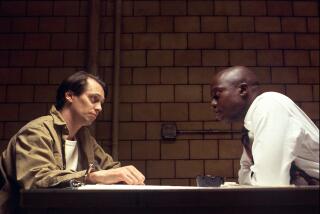LESSONS IN LAUGHTER The Autobiography of a Deaf Actor <i> by Bernard Bragg as signed to Eugene Bergman (Gallaudet University Press: $17.95; 340 pp.) </i>
- Share via
Sign language is deaf actor Bernard Bragg’s art form. In his autobiography he eloquently argues that deaf culture exits separate from the attempts of the deaf to function as “normal” hearing people. The child of deaf parents (his father was an amateur actor), Bragg recalls his shock when he discovered that he differed from the hearing. Upon entering the New York School for the Deaf, he further discovered that not all his classmates were equally versed in sign language. Some spoke expressively, using gestural vocabulary new to Bragg, while others could only communicate with crude finger-spelling.
Language and the discussion of language in “Lessons in Laughter” are its most interesting feature. There is a great discrepancy between the vividness of Bragg’s stories, which he signed, and the woodenness of the printed translation; it is a tribute to his superb storytelling that the reader can almost see the actor. The most memorable images from the stories demonstrate how complex, nuanced and passionate communication is conducted without spoken words. Bragg recalls the deaf people he has met whose signing increased his appreciation for the richness of the deaf language. And in a scene that takes place in the shower room of the New York School for the Deaf, a classmate threatens Bragg’s life with aggressive gestures: “I rubbed my eyes. The message he had signed to me looked all wrong. Had he really signed that he was going to kill me? I had never seen such a savage snarl on him. I asked him to repeat. Chopping the air violently with his hands, he signed, ‘You saw me all right.’ ”
The title refers not only to Bragg’s coming to terms with his own art and the hearing world, but also to the dreadful classroom experience, which in Bragg’s memory represents the hearing world’s awful imposition of hearing values on deaf children. A hearing teacher who apparently loathed the unfettered sounds of his deaf pupils decided one day that his students must learn to laugh in a seemly fashion. He made them hold their sides and perform exhalation exercises, correcting them when they did not emit the proper sounds.
More to Read
The biggest entertainment stories
Get our big stories about Hollywood, film, television, music, arts, culture and more right in your inbox as soon as they publish.
You may occasionally receive promotional content from the Los Angeles Times.










